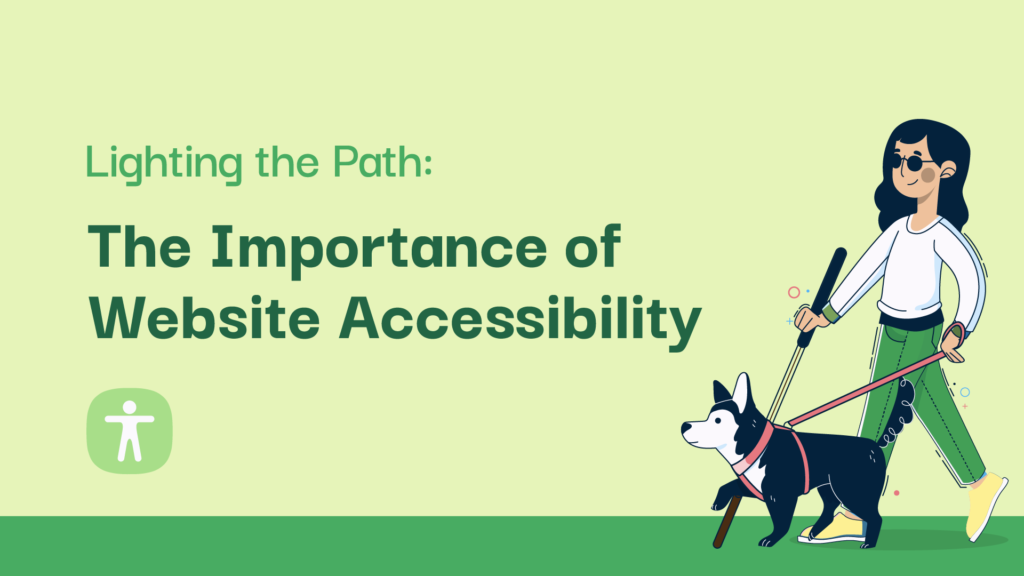Imagine just entering such a beautiful library with so much knowledge you’d want at your fingertips. All the subject matter you could possibly be looking for may line the shelves of such a great facility, but as you start to walk forward, you come to realize that something is wrong. The books are too high to reach, the labels too small to read, and the lights too dim to see clearly. Is it frustrating?
Think of this library as the vast world of the internet, and people faced with these challenges are the disabled users. This story is lived daily by more than a few million users across the globe. However, it doesn’t have to be that way—the doors to this library can be opened with something called website accessibility.
The Invisibilities in the Digital Era
Meet Sarah, the brilliant graphic designer who visualizes the whole world with poor vision. With all these fabulous capabilities, Sarah is excluded from participating online because exclusion has actually been designed into the sites. An attempt to visit a favorite design blog results in images without descriptions, buttons not reachable by her keyboard, and text superbly blended into the background. An Internet, once envisioned to be a utopia of connection and creation, gets turned into a labyrinth of frustration and exclusion.
Sarah is never a single story; for every Sarah, there is also a John who does not hear well, a Maya whose brain has some difficulties, or a Robert who speaks to his devices because he has difficulty moving. And these are just some of the obstacles that such users face day in and day out—from uncaptioned videos to complex layouts through which it’s virtually impossible to navigate mouse-free. But here’s the thing: these are surmountable barriers. They’re the result of simple neglect, and with awareness and a bit of forethought, they can indeed be prevented.
Why Should We Care?
Why does website accessibility matter? Simply because the internet belongs to all of us.
Every day, people like Sarah lose business, important information, and sometimes even basic services just because some of the websites aren’t accessible. But there’s more than just an ethical problem; it’s also a question of intelligence. Accessible websites enhance usability for everyone, not just people with disabilities. They load faster, are easier to use, and often appear higher in the search engines.
By making your website accessible, you’re not merely unlocking opportunities for others; you’re also creating opportunities for yourself.
Unlocking the Hidden Doors
Let’s go back to that grand library. Now, imagine lights brightened, labels enlarged, and bookshelves lowered. In one swoop, the place becomes an accessible space for discovery, learning, and growth. That is what happens when we make websites accessible. Alt text on images so Sarah can “see” what they are with her screen reader. Closed-captioning on videos so John is not put through struggles to follow along. It makes navigation a breeze for Maya so she never gets lost, and voice commands actually work for Robert.
Accessibility is not an afterthought but a core tenet of being able to know and recognize that people use the web in different ways—maintaining availability of the same information and services to all individuals, regardless of ability. Building bridges for a world with not so many closed doors: This is part of access.
The Ripple Effect.
But the benefits of rendering the web more accessible are far-reaching and extend well beyond just that one user. Accessible companies have a customer base from much wider backgrounds than ones that are not; schools and universities with their e-resources accessible create better outcomes for all students; even governments benefit as accessible online services open the doors to more civic participation by all citizens. Then there is the cultural shift.
The more sites that make a practice of accessibility, the greater it becomes the rule rather than the exception. This leads toward an inclusive Internet where all contributions, learning, and associations are possible. Conclusion The internet is mankind’s great library, where knowledge, creativity, and connectivity meld perfectly in harmonic fusion. But for the majority of the world’s population, it remains firmly shut. This is where accessibility to a website opens such doors, making the digital world one that anybody can prosper in.
So as you keep developing your internet space, think about it: will you open up the doors, or are you keeping them closed? After all, it is our common internet that stays accessible to everyone, and it is the concern of each and every one of us that it does so.
